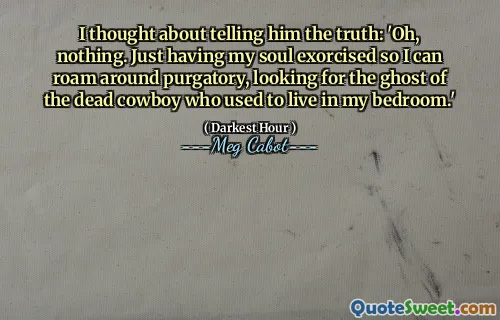
I thought about telling him the truth: 'Oh, nothing. Just having my soul exorcised so I can roam around purgatory, looking for the ghost of the dead cowboy who used to live in my bedroom.'
This quote vividly captures a surreal and haunting mindset, blending elements of the supernatural with personal introspection. The idea of having one's soul exorcised implies a desire for cleansing or liberation from inner torments, perhaps alluding to a struggle with guilt, remorse, or unresolved emotional baggage. The imagery of roaming around purgatory suggests a liminal state — neither alive nor dead — emblematic of the feeling of being caught in between, perhaps stuck in memories or unresolved issues from the past.
The mention of a ghost of a dead cowboy introduces a nostalgic or symbolic figure, representing a bygone era or qualities like rugged independence, freedom, or resilience that once defined this 'bedroom' space, which might be symbolic of personal history or a specific place in one's life. The playful yet eerie tone hints at a desire to confront, understand, or perhaps even humorously acknowledge the intangible ghosts that haunt us—be they memories, regrets, or figurative spirits we carry.
This passage invites reflection on how we deal with our emotional ghosts and the processes of healing or acceptance. It underscores the importance of confronting our inner histories, even if it feels like exorcising a ghost or wandering through purgatory. The surreal and poetic language underscores the complex, often contradictory feelings associated with confronting one's past, identity, and unresolved parts of oneself.
Overall, the quote draws you into a world where reality blends with the spiritual and the metaphorical, emphasizing personal growth amidst haunting memories and the strange comfort that can be found in acknowledging our haunted spaces.
(Darkest Hour) - Meg Cabot






